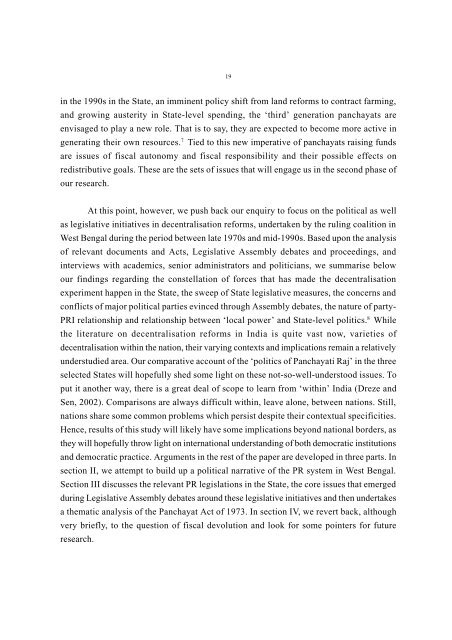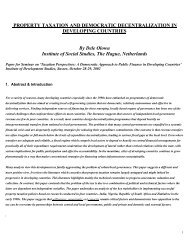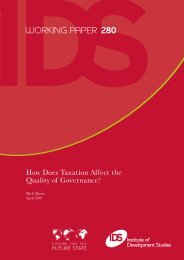View Article - Institute of Development Studies
View Article - Institute of Development Studies
View Article - Institute of Development Studies
Create successful ePaper yourself
Turn your PDF publications into a flip-book with our unique Google optimized e-Paper software.
19in the 1990s in the State, an imminent policy shift from land reforms to contract farming,and growing austerity in State-level spending, the ‘third’ generation panchayats areenvisaged to play a new role. That is to say, they are expected to become more active ingenerating their own resources. 7 Tied to this new imperative <strong>of</strong> panchayats raising fundsare issues <strong>of</strong> fiscal autonomy and fiscal responsibility and their possible effects onredistributive goals. These are the sets <strong>of</strong> issues that will engage us in the second phase <strong>of</strong>our research.At this point, however, we push back our enquiry to focus on the political as wellas legislative initiatives in decentralisation reforms, undertaken by the ruling coalition inWest Bengal during the period between late 1970s and mid-1990s. Based upon the analysis<strong>of</strong> relevant documents and Acts, Legislative Assembly debates and proceedings, andinterviews with academics, senior administrators and politicians, we summarise belowour findings regarding the constellation <strong>of</strong> forces that has made the decentralisationexperiment happen in the State, the sweep <strong>of</strong> State legislative measures, the concerns andconflicts <strong>of</strong> major political parties evinced through Assembly debates, the nature <strong>of</strong> party-PRI relationship and relationship between ‘local power’ and State-level politics. 8 Whilethe literature on decentralisation reforms in India is quite vast now, varieties <strong>of</strong>decentralisation within the nation, their varying contexts and implications remain a relativelyunderstudied area. Our comparative account <strong>of</strong> the ‘politics <strong>of</strong> Panchayati Raj’ in the threeselected States will hopefully shed some light on these not-so-well-understood issues. Toput it another way, there is a great deal <strong>of</strong> scope to learn from ‘within’ India (Dreze andSen, 2002). Comparisons are always difficult within, leave alone, between nations. Still,nations share some common problems which persist despite their contextual specificities.Hence, results <strong>of</strong> this study will likely have some implications beyond national borders, asthey will hopefully throw light on international understanding <strong>of</strong> both democratic institutionsand democratic practice. Arguments in the rest <strong>of</strong> the paper are developed in three parts. Insection II, we attempt to build up a political narrative <strong>of</strong> the PR system in West Bengal.Section III discusses the relevant PR legislations in the State, the core issues that emergedduring Legislative Assembly debates around these legislative initiatives and then undertakesa thematic analysis <strong>of</strong> the Panchayat Act <strong>of</strong> 1973. In section IV, we revert back, althoughvery briefly, to the question <strong>of</strong> fiscal devolution and look for some pointers for futureresearch.





